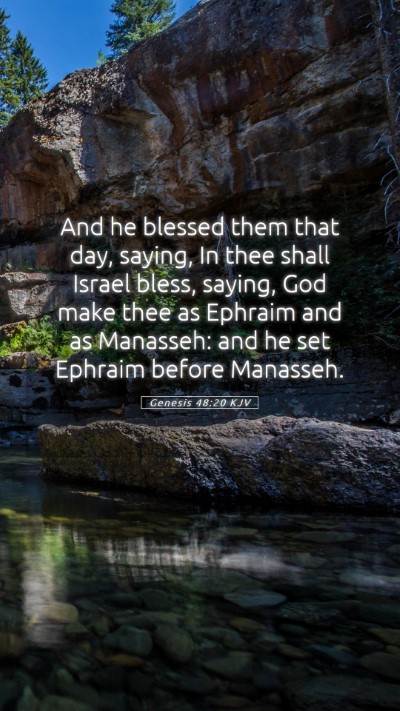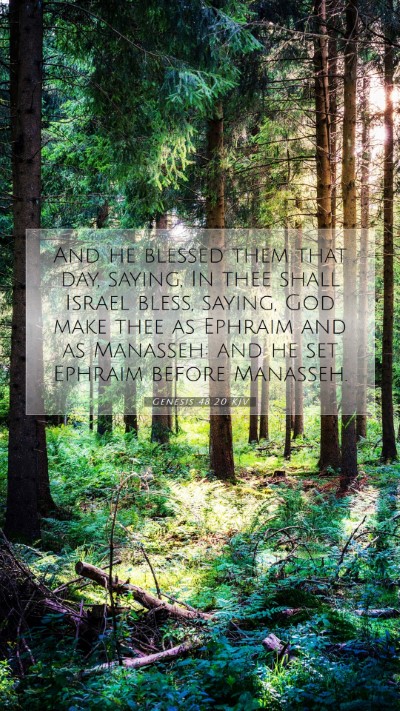Bible Verse Meaning of Genesis 48:20
Verse: Genesis 48:20 states, "So he blessed them that day, saying, 'In you shall Israel bless, saying, "God make you as Ephraim and as Manasseh."' And thus he put Ephraim before Manasseh."
Understanding This Scripture
This verse highlights a moment of significance in the blessings given by Jacob (Israel) to his grandsons, Ephraim and Manasseh. The act of blessing them carries profound implications for the future of Israel, showcasing the importance of the family lineage and the role of these two tribes in the narrative of the Old Testament.
Insights from Public Domain Commentaries
Matthew Henry's Commentary
Matthew Henry emphasizes the significance of Jacob blessing Ephraim and Manasseh in this context. He notes that the act of blessing signifies a transfer of authority and inheritance since Jacob, with prophetic insight, establishes Ephraim as the more prominent tribe, despite being the younger brother. This arrangement foreshadows the future prominence of Ephraim in the nation of Israel, contrasting the traditional primacy of the firstborn.
Albert Barnes' Notes
Albert Barnes highlights the cultural context where birth order plays a crucial role in blessing and inheritance. He points out that Jacob's preference for Ephraim over Manasseh was divinely inspired, indicating how God's plans often subvert human expectations. Barnes notes how this blessing also serves as a prophetic declaration about the future success of the tribes associated with them, showing that the favor of God can rest upon those chosen even if they seem less worthy by worldly standards.
Adam Clarke's Commentary
Adam Clarke provides a detailed analysis of the text, noting that the blessing given is not just a personal favor but encompasses the future of the entire nation. He emphasizes that by blessing Ephraim in a greater measure, Jacob is acknowledging the unique role that both tribes will play in Israel's history. Clarke also discusses the interrelation between the tribes, hinting at the eventual rivalry between them, especially as seen later in the scriptures.
Major Themes in This Verse
- Divine Choice: The verse illustrates how God’s selection goes beyond human conventions, illustrating the theme of divine sovereignty in choosing leaders and tribes.
- Legacy and Identity: The blessings serve to solidify Ephraim and Manasseh's identities as tribes of Israel, reinforcing their roles in the narrative of God's people.
- Future Prosperity: The blessing reflects a desire for prosperity and growth within Israel, highlighting the importance of community and family ties.
Bible Study Insights
For those engaging in Bible study, this verse provides rich material for discussion and exploration. It prompts questions about how we define leadership and the qualities we value within our communities.
Utilizing tools such as Bible study guides and online resources, one can delve deeper into the historical context of this passage, looking at how the tribes evolved over time and their role within the larger narrative of the Scriptures.
Application in Daily Life
This passage encourages reflection on our personal values and the importance of blessings in our lives. Do we lift up others as Jacob lifted up Ephraim and Manasseh? In a way, we can apply these insights by actively blessing and encouraging the next generation, recognizing their potential despite social hierarchies.
Cross References
- Genesis 49:22-26: Jacob's blessings upon his other sons, focusing on the significance of each tribe.
- Deuteronomy 33:13-17: Moses’ blessings on the tribes, reiterating Ephraim's prominence.
- 1 Chronicles 5:1-2: Discusses the lineage of Ephraim and how the blessings of Jacob played out.
Conclusion
Genesis 48:20 encapsulates themes of choice, identity, and legacy in God’s plan. Understanding scripture through this lens opens new avenues for Bible verse interpretations and offers profound insights into the nature of blessings and community. As we reflect on this verse, we gain a deeper appreciation for the historical and spiritual significance within our faith journeys.


